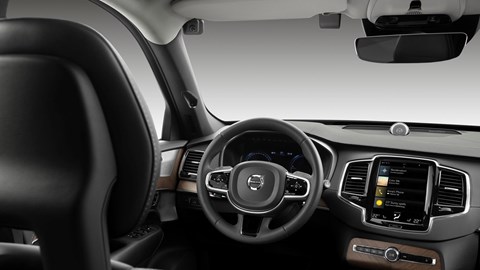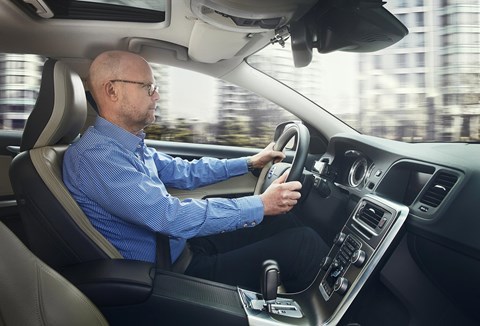► Volvo readies in-car cameras
► Lenses to monitor drivers’ health
► Spycams or The Next Big Thing?
After rolling-out a 112mph speed-cap on all its cars from 2020, Volvo has now pledged to include driver-facing cameras and sensors in all its vehicles, too. The cameras and sensors should be present in all Volvo models by the early 2020s and will work to crackdown on – and look for – signs of driver distraction. Think checking your phone, being intoxicated and generally not paying attention to the road.
If distraction is detected, Volvo says the cars could either reduce the car’s speed, slow down and park the car – or contact Volvo’s on Call assistance service.
Like the speed-cap revealed earlier in the year, the new measures should boost Volvo’s progress towards Vision 2020, a mission to stop fatalities in cars by 2020. Volvo spoke to CAR earlier in the year about the system, and you can see what the Swedish brand originally said before.

Everything else we know
Although some owners may fear spycams watching their every move, tech bosses are adamant that smart cameras will bring a host of benefits to owners in the same way that modern mobile phones and wearable tech monitor your health.
Atif Rafiq, Volvo’s chief digital officer, told CAR that the cameras are being developed – but only as an option, so they’re not forced upon customers. This neatly sidesteps the thorny issue of perceived surveillance behind the wheel.
‘Driver-facing cameras will become an option in our cars next year,’ Rafiq said. ‘They’re very advanced these days: they can determine a driver’s glucose levels by looking at their pupils, so could call a loved one or hospital if it detected a health problem. Cars will understand your state and destress you on your way back from work.’
Volvo has since asked us to clarify that these cameras won’t be ready until after 2020. We are happy to publish this additional information.
Why Volvo is filming drivers to anticipate problems ahead
The Swedish brand is famous for putting occupant safety as one of its top goals and it believes that camera technology is now so advanced that it can actively predict driver health problems before they happen. As far back as 2014, it filmed drivers in Shanghai (below) as it sought to understand how humans reacted in stressful city driving.

And Volvo has been busy testing onboard cameras in its XC90 Drive Me autonomous car test project. In 2017 it showcased the smart cams in the cabin used to track driver behaviour as the car flicked between autonomous and conventional driving; these cameras proved a vital learning step towards the production units being prepared for launch after 2020.
Won’t people mind being filmed as they drive?
Volvo believes that users will rapidly learn to trust onboard cameras: footage will be anonymised and not shared, plus there’s a whole world of biometric possibility out there, predicts Rafiq. ‘Cameras can be used for video conferencing and ID purposes too. Your car will recognise you and set your Google apps, climate control and seating position for you. It’s very clever,’ he told CAR magazine.
Sounds to us like modern consumers will quickly get over fears they’re being spied upon. After all, how many people disable the facial scanning of their iPhone X smartphones? For the majority it’ll be less another erosion of privacy, and rather a whole world of technological opportunity.
Would you welcome a camera tracking your every move? Sound off in the comments below!